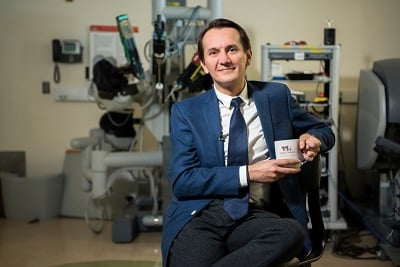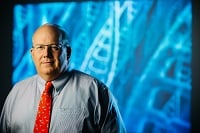Children's facial recognition technology lauded by STAT for impact, novelty
STAT "˜Editor's Pick' finalists are the year's most creative, impactful biomedical innovations

WASHINGTON–Children's National facial recognition technology that enables more timely diagnoses of rare diseases and common genetic disorders, helping to improve kids’ health outcomes around the world, garnered more than 33,000 overall votes during STAT Madness 2018, a bracket-style competition honoring biomedical advances. Children’s first-ever entry advanced through five brackets in the competition and, in the championship round, finished second.
Children’s National Health System also was among four “Editor’s Pick” finalists, entries that span a diverse range of scientific disciplines. Journalists at the digital publication STAT pored through published journal articles for 64 submissions in the single-elimination contest to honor a select group of entries that were the most creative, novel, and most likely to benefit the biomedical field and the general public.
“We at Children’s National are deeply honored by this national recognition,” says Kolaleh Eskandanian, Ph.D., M.B.A., PMP, Children’s Vice President and Chief Innovation Officer. “We aim to transform innovative ideas into transformational solutions and this technology, which is undergoing clinical validation needed for market clearance, is a prime example of how these innovative solutions can benefit children around the world.”
Each year, 1 million children are born worldwide with a genetic condition that requires immediate attention. Because many of these children experience serious medical complications and go on to suffer from intellectual disability, it is critical that doctors accurately diagnose genetic syndromes as early as possible. Partnering with the National Institutes of Health National Human Genome Research Institute and clinicians from 20 countries, Children’s National research-scientists demonstrated the potential widespread utility of digital dysmorphology technology to diverse populations with genetic conditions. The technology enables clinicians to identify children with genetic conditions earlier by simply taking the child’s photo.
“For years, research groups have viewed facial recognition technology as a potent tool to aid genetic diagnosis. Our project is unique because it offers the expertise of a virtual geneticist to general health care providers located anywhere in the world,” says Marius George Linguraru, D.Phil., M.A., M.S., a Sheikh Zayed Institute for Pediatric Surgical Innovation principal investigator who invented the technology. “Right now, children born in under-resourced regions of the U.S. or the world can wait years to receive an accurate diagnosis due to the lack of specialized genetic expertise in that region.”
 In addition to providing patient-specific benefits, Marshall Summar, M.D., director of Children’s Rare Disease Institute that partners in the facial recognition technology research, says the project offers wider societal benefit.
In addition to providing patient-specific benefits, Marshall Summar, M.D., director of Children’s Rare Disease Institute that partners in the facial recognition technology research, says the project offers wider societal benefit.
“Right now, parents can endure a seemingly endless odyssey as they struggle to understand why their child is different from peers,” says Dr. Summar. “A timely genetic diagnosis can dispel that uncertainty and replace it with knowledge that can speed patient triage and deliver more timely medical interventions.”
Media contact: Diedtra Henderson | 443-610-9826 | 202-476-4500



